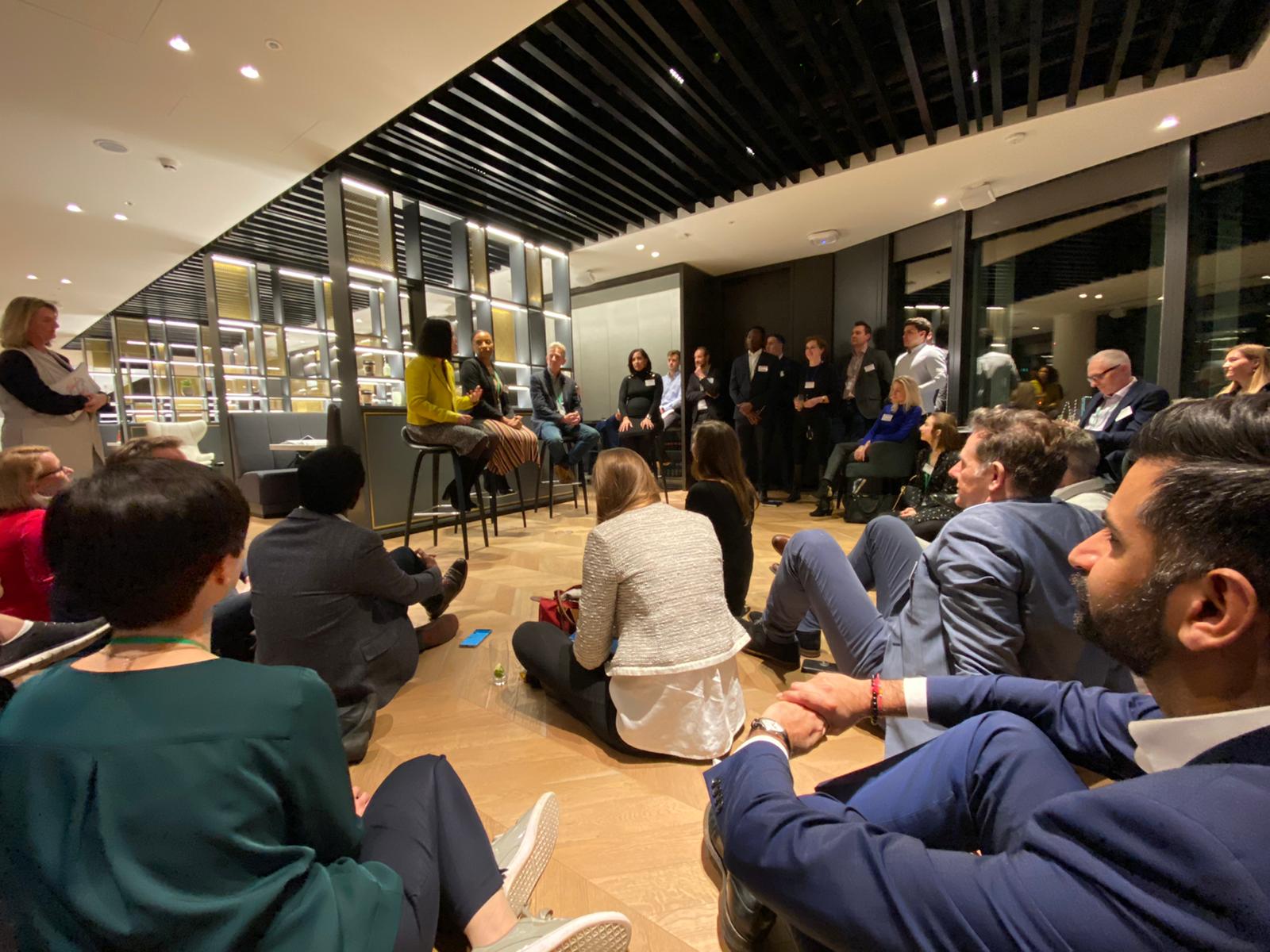
- BLOG
- Event
Wellbeing@Work Quarterly Meet Up - January 2020
Summary of the Wellbeing@Work quarterly meet-up: 29th January 2020
Revitalising smoothies, delectable canapés and views of the London skyline, the first Wellbeing@Work meet-up of 2020 was off to a great start. After a warm welcome by the evening’s host, Scott Wheatley, Partner at Deloitte Consulting and Louise Brett, the audience were treated to a wonderful energiser by Bruce Greenhalgh (Global Health and Wellbeing Clinical Lead at BT). This was followed by a thought-provoking panel discussion and Q&A, chaired by our Founder and CEO Kirsten Samuel, with three leaders in workplace wellbeing: Arti Kashyap-Aynsely (Wellbeing Leader at Deloitte Consulting UK), Tari Okoye (Financial Wellbeing Development Manager at Morrinson Wealth Wellbeing) and Bruce Greenhalgh. So, what were some of our learnings?
Arti led us on her journey, from piloting a wellbeing programme to embedding wellbeing within the consulting practice. Currently, her team are focusing on how to put purpose at the heart of the business by viewing wellbeing as an essential rather than simply a ‘nice-to-have’. Arti offered three pieces of advice for companies embarking on their wellbeing journey. First, she urged that we put ourselves in the employee’s shoes. We can only begin to really make a difference if we take the time to truly understand peoples’ challenges and aspirations. Second, she encouraged us to take risks. There may be some initiatives which work better than others, but you can’t expect radical transformation without a ‘test and learn’ approach. Third, she emphasized that we must go beyond one-off sessions to instil long-lasting change. If employees are working long days, there should be training for leaders and on-hand support for staff from the beginning of a new project and throughout - where open, ongoing and supportive dialogue is the norm.
BT as pioneers, have been addressing workplace wellbeing for decades, with a broader model of education and support to include purpose, environment, relationships, health and security (e.g. financial, physical, mental). 10 years ago, BT trained over eight thousand-line managers – Bruce recognises the importance of line managers and their ability to make a significant difference to their teams’ wellbeing. Bruce also astutely observed that while mental health is less stigmatised nowadays, there are still other issues that remain taboo, for example, debt. He imparted three suggestions for companies seeking to improve the wellbeing of their staff. First, don’t just seek mental health champions as a one-off initiative, but reinvigorate your champions and continue to find inspirational individuals who can lead the way. Second, he highlighted the importance not only of mental health training courses, but of vetting employees who wish to be champions to ensure they are the right individuals and that they receive the necessary education and ongoing support. Third, Bruce noted that wellbeing is now firmly on the agenda and here to stay so companies should ride the wave as there has never been a better time.
Tari spoke passionately about the inextricable link between financial wellbeing and mental health; unfortunately, many of us underestimate this connection. As a result of financial struggles, people begin to feel a loss of control which can trigger a severe deterioration in their wellbeing. In the UK, ‘finances’ has been cited as the no1. concern for UK employees and that a strategy that addresses both mental health and financial wellbeing will have the greatest impact on employees’ lives. Tari shared 3 recommendations for companies wishing to support their employees’ financial wellbeing. First, don’t overlook the human element. Having a conversation is vital, we cannot create a cultural shift if people are not discussing the problem. Second, proactively educate your staff – many people reach adulthood with very little financial literacy. Third, take the time to personalise and target your offerings to your audience to maximise engagement, relevancy and positive behaviour change.
The Q&A which followed was exceptionally constructive. One member of the audience raised the challenge of providing personalised wellbeing programs. Bruce advised liaising with communication leads and emphasized the importance of speaking the language of your target demographic. Another query related to metrics for measuring wellbeing, to which all three panellists commented on the central role of qualitative data. Numbers are of course important, but success stories can have a monumental impact on conveying the effectiveness of a wellbeing initiative. Lastly, one attendee asked how the government could help, and there was a consensus that education from an early age (i.e. school age) was critical on the perception and impact of things like exercise, mindfulness and financial literacy.
To round off the evening, we heard from Elizabeth Hampson (Director in Health and Life Sciences Strategy at Deloitte Consulting) who co-authored the latest Deloitte report Refreshing the Case for Investment. The report reveals some invaluable insights:
- The cost of poor mental health has increased by 16% since 2017 to £42bn - £45bn each year.
- This comprises £7bn in absenteeism, £9bn in the costs of staff turnover and £27bn-£29bn in presenteeism.
- The rise in presenteeism is a result of working in an ‘always on’ culture where taking time off is perceived as increasingly less acceptable.
- The costs of poor mental health are disproportionately high among young people at 8.3% of average salary compared to an average of 5.8% across all age groups. This highlights a need to help young people transition from education into working life.
- The estimated ROI of investing in mental health is £5 for every £1 spent.
- The interventions with the highest returns focus on preventative large-scale initiatives and using technology or diagnostics to personalise support to those in need.
The report clearly demonstrates that the business case for wellbeing has never been more compelling. Combined with the inspiring success stories from the panellists, we left the meet-up feeling inspired, educated and energised, and ready drive the wellbeing agenda forwards, together.
